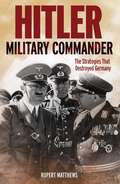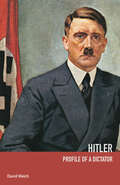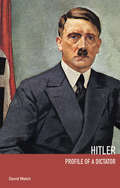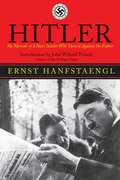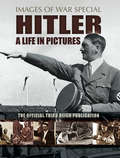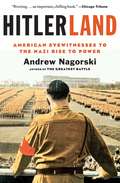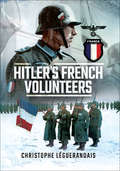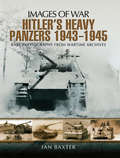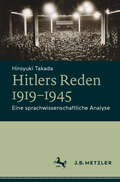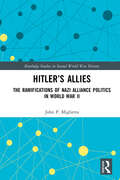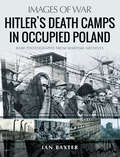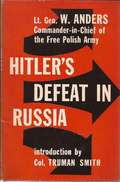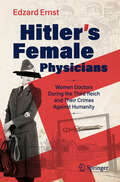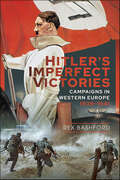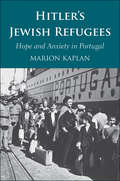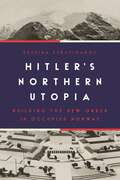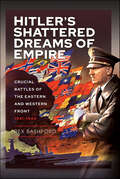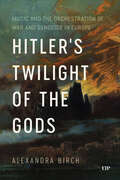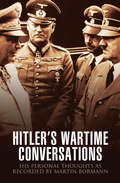- Table View
- List View
Hitler: Military Commander
by Rupert MatthewsA comprehensive examination of Hitler’s military strategies.As Führer of the Third Reich, Hitler was responsible for deciding the German war aims in 1939. As head of the Armed Forces from February 4th, 1938, he was also responsible for the overall Wehrmacht strategy intended to achieve these aims. Hitler: Military Commander examines with impeccable detail Hitler's key military decisions during the Second World War, and assesses how far these decisions were militarily justified in the light of the intelligence available at the time. Perhaps most importantly, it tackles the larger questions of how a non-German former corporal, albeit the holder of the Iron Cross First Class, managed to take personal control of an army with the Prussian traditions of the German army; to appoint, sack, and sentence to death its generals at will, to lead it into a World War it was not prepared for; and to ultimately destroy it. Featuring black-and-white photographs, maps, biographical context, tactical analysis, and more, this new edition of Hitler: Military Commander will give readers the comprehensive overview of Hitler's military decisions and downfall.
Hitler: Profile of a Dictator
by David WelchHitler: Profile of a Dictator is a fascinating exploration of Hitler and his role in the Third Reich. The book unravels the complex historiographical debate surrounding this notorious figure by examining his personality, his ideas and the nature of his power.Hitler: Profile of a Dictator surveys Hitler's career chronologically and includes coverage of:* the young idealogue* the Führer State* Hitler's role in the outbreak of the Second World War* Hitler's involvement in the Holocaust.This second edition brings the continuing debate up to date in light of the most recent reseach, and speculates on the implications of the Irving trial.
Hitler: Profile of a Dictator
by Martyn HousdenHitler: Profile of a Dictator is a fascinating exploration of Hitler and his role in the Third Reich. The book unravels the complex historiographical debate surrounding this notorious figure by examining his personality, his ideas and the nature of his power.Hitler: Profile of a Dictator surveys Hitler's career chronologically and includes coverage of:* the young idealogue* the Führer State* Hitler's role in the outbreak of the Second World War* Hitler's involvement in the Holocaust.This second edition brings the continuing debate up to date in light of the most recent reseach, and speculates on the implications of the Irving trial.
Hitler: The Memoir of the Nazi Insider Who Turned Against the Fuhrer
by Ernst Hanfstaengl John Willard TolandOf American and German parentage, Ernst Hanfstaengl graduated from Harvard and ran the family business in New York for a dozen years before returning to Germany in 1921. By chance he heard a then little-known Adolf Hitler speaking in a Munich beer hall and, mesmerized by his extraordinary oratorical power, was convinced the man would some day come to power. As Hitler's fanatical theories and ideas hardened, however, he surrounded himself with rabid extremists such as Goering, Hess, and Goebbels, and Hanfstaengl became estranged from him. But with the Nazi's major unexpected political triumph in 1930, Hitler became a national figure, and he invited Hanfstaengl to be his foreign press secretary. It is from this unique insider's position that the author provides a vivid, intimate view of Hitler--with his neuroses, repressions, and growing megalomania--over the next several years. In 1937, four years after Hitler came to power, relations between Hanfstaengl and the Nazis had deteriorated to such a degree that he was forced to flee for his life, escaping to Switzerland. Here is a portrait of Hitler as you've rarely seen him.
Hitler: The Official Third Reich Publication (Images of War Special)
by Bob CarruthersThis exceptional source is probably the best of the contemporary accounts of Hitler in power, albeit from a heavily pro-Nazi stance. The testimonies collected together were based on interviews conducted by Heinz A. Heinz in 1933 and 1934, shortly after Hitler had taken power.Millions of ordinary Germans fell under Hitler's spell and this book is a creation of those emotions. It is very much a product of its time. Written by the party big-wigs, such as Goering, Speer and Goebbels, and published in 1935 under the title Adolf Hitler Bilder Aus Dem Leben Des Furhers, it appeared at a time when they were at the height of their unrivaled powers. This fascinating volume encompasses the superb photography of Heinrich Hoffman, the Munich photographer who was ever present on Hitler's journeys and who grew fabulously wealthy as a result of his intimate access to Hitler. Hitler had an innate understanding of what we would now call public relations. He recognised the excellence of Hoffman's photography and maintained control of his image by limiting the access of other photographers. He also strictly controlled Hoffmann's activities and personally selected the portraits that were allowed to go into circulation.The book incorporates sections on Hitler and the German people, Hitler and the German workers, Hitler and public works and so on, all accompanied by a series of excellent photographs which form a remarkable record of the public face of a man during his brief spell of absolute power. The Nazis were the first party who harnessed the full power of the media in a coherent and all-embracing manner.This is a classic example of the strength of their presentation skills. It is a compelling time-capsule which conveys vividly in almost visceral way the zeitgeist of the thirties in Nazi-Germany. By 1935 the bulk of the German people had fallen in behind Adolf Hitler, and with documents as persuasive as this, it is not too difficult to comprehend the allure of the glittering faade which a stream of publications such as this book sought to create and maintain.
Hitlerland: American Eyewitnesses to the Nazi Rise to Power
by Andrew NagorskiHitler's rise to power, Germany's march to the abyss, as seen through the eyes of Americans--diplomats, military, expats, visiting authors, Olympic athletes--who watched horrified and up close. By tapping a rich vein of personal testimonies, Hitlerland offers a gripping narrative full of surprising twists--and a startlingly fresh perspective on this heavily dissected era. Some of the Americans in Weimar and then Hitler's Germany were merely casual observers, others deliberately blind; a few were Nazi apologists. But most slowly began to understand the horror of what was unfolding, even when they found it difficult to grasp the breadth of the catastrophe. Among the journalists, William Shirer, Edgar Mowrer, and Dorothy Thompson were increasingly alarmed. Consul General George Messersmith stood out among the American diplomats because of his passion and courage. Truman Smith, the first American official to meet Hitler, was an astute political observer and a remarkably resourceful military attaché. Historian William Dodd, whom FDR tapped as ambassador in Hitler's Berlin, left disillusioned; his daughter Martha scandalized the embassy with her procession of lovers from her initial infatuation with Nazis she took up with. She ended as a Soviet spy. On the scene were George Kennan, who would become famous as the architect of containment; Richard Helms, who rose to the top of the CIA; Howard K. Smith, who would coanchor the ABC Evening News. The list of prominent visitors included writers Sinclair Lewis and Thomas Wolfe, famed aviator Charles Lindbergh, the great athlete Jesse Owens, newspaper publisher William Randolph Hearst, and black sociologist and historian W.E.B. Dubois. Observing Hitler and his movement up close, the most perceptive of these Americans helped their reluctant countrymen begin to understand the nature of Nazi Germany as it ruthlessly eliminated political opponents, instilled hatred of Jews and anyone deemed a member of an inferior race, and readied its military and its people for a war for global domination. They helped prepare Americans for the years of struggle ahead.
Hitlers French Volunteers
by Christophe LeguérandaisFrom 1941 to 1945, a large number of foreign soldiers were incorporated into the ranks of the German army in order to compensate for the enormous losses suffered by the Wehrmacht, including thousands of French. Whether fighting against the Soviets on the Eastern Front, with the Afrika-Korps in Tunisia or fighting with the occupying army in France, these volunteers generally took the plunge to join the Germans with the authorization of their own government, even though there was never any 'formal link' to the Vichy regime.For the first time in the English language, this book provides details of the units' various insignias, along with rare and previously unpublished and personal photographs of the few surviving members interviewed by the author. As a result, a new vision of these collaborators emerges, allowing them to be regarded as adventurers or even nationalists. After all, despite being clothed in the enemy's uniform, the majority of these soldiers respected their oath of allegiance, often giving their lives in return.
Hitlers Hangmen: The Secret German Plot to Kill Churchill
by Brian LettBefore and after the outbreak of the Second World War there were sizeable Fascist groups active in Britain, working to overthrow the British government. Most of the Fascist leaders were interned in 1940 as soon as Churchill came to power, but were freed in the better times of 1944, all the more embittered and just as intent on installing a Fascist government and taking revenge on Churchill. By late 1944 there were hundreds of thousands of German prisoners of war in Britain, many of them in camps brutally dominated by the SS and other Nazi fanatics. When Hitler tried to restore Germany&’s position with his massive Battle of the Bulge offensive he gave orders for this to be supported by a break-out from all of the POW camps under Nazi control. Some of the escapers were to head for London to assassinate Churchill, with the help of the British Fascists. It was only by chance that the plot was foiled. This is the incredible, disturbing story of how close British Fascists came to impacting the outcome of the Second World War. It is also a comprehensive investigation of the break-out plot as it unfolded across Britain: how it came to fruition and how it was quashed, its repercussions and the many little-known stories of escape and recapture which took place throughout the country.
Hitlers Heavy Panzers, 1943–1945 (Images of War)
by Ian BaxterThis WWII pictorial history offers a fully illustrated and informative look at Nazi Germany&’s fearsome heavy tanks with rare wartime photos. With its authoritative text, detailed captions, and rare images, this volume chronicles the last desperate years of the Wehrmacht Panzerwaffe. Despite a worsening strategic situation both on the Eastern Front and in the West, Hitlers Panzers and their highly motivated crews showed superior tactical abilities and killing power—yet these armored battalions were not enough to alter the course of the war as the Allies closed in on Berlin. This superb book covers many variants to the Heavy Panzer, some well-known and others less so—including modified, up-armored and up-gunned tanks. Copious images of Tigers 1 and 11, Panzerjager, Panthers, Panzer 4s, StuG IV and III, Wespes, Hummels are provided as well as other fine examples of German engineering.
Hitlers Reden 1919–1945: Eine sprachwissenschaftliche Analyse
by Hiroyuki TakadaHitlers Reden spielten eine entscheidende Rolle im Prozess der nationalsozialistischen „Machtergreifung“ und der späteren Durchsetzung ihrer Politik. Das Buch untersucht die Gründe für die enorme Wirkung von Hitlers Auftritten, indem es die 1,7 Millionen Wörter, die die Reden umfassen, systematisch und in ihrer Entwicklung analysiert. Unter Einbeziehung der historischen und technikgeschichtlichen Hintergründe sowie detaillierten Beschreibungen von Hitlers Auftreten, seinen Gesten und rhetorischen Mitteln entsteht so eine Gesamtdarstellung von Hitlers Entwicklung als Redner – von den euphorisierenden Anfängen in den Bierkellern bis zu den kaum mehr beachteten Einlassungen am Ende des Krieges.
Hitlers Prisons: Legal Terror in Nazi Germany
by Nikolaus WachsmannState prisons played an indispensable part in the terror of the Third Reich, incarcerating many hundreds of thousands of men and women during the Nazi era. This important book illuminates the previously unknown world of Nazi prisons, their victims, and the judicial and penal officials who built and operated this system of brutal legal terror. Nikolaus Wachsmann describes the operation and function of legal terror in the Third Reich and brings Nazi prisons to life through the harrowing stories of individual inmates. Drawing on a vast array of archival materials, he traces the series of changes in prison policies and practice that led eventually to racial terror, brutal violence, slave labor, starvation, and mass killings. Wachsmann demonstrates that "ordinary" legal officials were ready collaborators who helped to turn courts and prisons into key components in the Nazi web of terror. And he concludes with a discussion of the whitewash of the Nazi legal system in postwar West Germany.
Hitler’s Allies: The Ramifications of Nazi Alliance Politics in World War II (Routledge Studies in Second World War History)
by John P. MigliettaThis book examines the significance of alliances in the international system, focusing on the dynamics between great and regional powers, and on the alliances Nazi Germany made during World War II, and their implications for Germany. It examines a variety of case studies and looks at how each of the respective states contributed to or weakened Nazi Germany’s warfighting capabilities. The cases cover the principal Axis members Italy and Japan, secondary Axis allies Hungary and Romania, as well as neutral states that had economic and military significance for Germany, namely Bulgaria, Iran, Spain, Sweden, Switzerland, Turkey, and Vichy France. Additional case studies include topics such as the German attempts to cultivate Arab nationalism, focusing on German involvement in the coup in Iraq against the pro-British government, and the wartime state of Croatia, whose creation was made possible by Germany, with the rivalry between Germany and Italy for control being a major focus. The book also includes a case study exploring the unique position of Finland among German allies as a democracy and how the country was essentially fighting a very different war from Nazi Germany. This will be of interest to students and academics with an interest in power dynamics in World War II, economic, political, strategic, and alliance theory, and scholarly debate on Nazism and Europe.
Hitler’s Death Camps in Occupied Poland: Rare Photographs from Wartime Archives (Images of War)
by Ian BaxterCovers the six principal extermination camps in Nazi occupied Poland; a sobering reminder of the horrors of the Holocaust.Nearly 80 years on, the concept and scale of the Nazis’ genocide program remains an indelible, nay almost unbelievable, stain on the human race. Yet it was a dreadful reality of which, as this graphic book demonstrates, all too much proof exists. Between 1941 and 1945 an estimated three and a half million Jews and an unknown number of others, including Soviet POWs and gypsies, perished in six camps built in Poland; Auschwitz-Birkenau, Belzec, Chelmno, Majdenak, Sobibor and Treblinka. Unpleasant as it may be, it does no harm for present generations to be reminded of man’s inhumanity to man, if only to ensure such atrocities will never be repeated. This book aims to do just this by tracing the history of the so called Final Solution and the building and operation of the Operation Reinhard camps built for the sole purpose of mass murder and genocide.
Hitler’s Defeat In Russia
by Lieutenant-General Władysław AndersTo both professional soldiers and historians, the causes of the German catastrophe in Eastern Europe in the years from 1941 to 1945 will ever remain an absorbing problem. Why did Hitler’s hitherto invincible Wehrmacht—which between September 1939 and June 1941 had knocked over like tenpins the far from negligible armies of Poland, France, and Yugoslavia, had driven three-hundred-odd thousand British from the continent in a campaign of a few brief weeks, and had spread the rule of Hitler’s Reich from Brest to Crete and from Arctic Narvik to the desert sands of Tripoli—why did this Wehrmacht come to a dead halt before Moscow within six months of launching its all-out assault on the Soviet Union? Why, once again in the autumn of 1942, did the Wehrmacht suffer such an overwhelming defeat at Stalingrad—after occupying nearly half of European Russia, reducing the Red armies to less than two and one half million men at the beginning of 1942, and planting the swastika on Mount Elbrus in the Caucasus, more than 1,000 miles from its advanced base in Poland?These are questions General Anders attempts to answer in the present analytical study of the Russo-German war—and, in my opinion, he succeeds to the full, with amazing clarity and unanswerable logic.-Foreword.
Hitler’s Female Physicians: Women Doctors During the Third Reich and Their Crimes Against Humanity
by Edzard ErnstThere have been many books about the doctors of the Third Reich and their atrocities. Most of these books neglect the contribution of women in the medical profession. In this book, they are the focus of attention. The first section of the book explains the background of the Third Reich in general and medicine during this period in particular. It addresses the situation of female doctors and why there were relatively few of them. It goes on to detail the forms of transgression that occurred under Nazi rule—involuntary sterilization, euthanasia, and mass murder of Jews and other groups considered undesirable. The second part of the book is a collection of 38 alphabetically arranged biographies of individual female doctors who participated in these activities. It reports on the actions they took and what happened to them after the war. The final chapter draws some conclusions, which can be briefly summarized as follows: 1) the female doctors' role remains under-researched, 2) generally speaking, female doctors were also guilty, but their transgressions generally less gruesome than those of their male colleagues, 3) many of the deeds of female doctors are nevertheless shocking.
Hitler’s French Literary Afterlives, 1945-2017
by Manuel BragançaThis book analyses the successive appearances of Adolf Hitler in French fiction between 1945 and 2017. It discusses why, unlike what has been observed in the US and in the UK, it has proven problematic for French novelists to write about Hitler in their numerous fictional explorations of the Second World War. It examines the literary and ethical challenges of including historical characters such as Hitler in fiction, and demonstrates how these challenges evolved over time as memories of the Second World War also evolved in France.
Hitler’s Germany: Origins, Interpretations, Legacies (2nd edition)
by Roderick StackelbergHitler's Germany provides a comprehensive narrative history of Nazi Germany and sets it in the wider context of nineteenth- and twentieth-century German history. Roderick Stackelberg analyzes how it was possible that a national culture of such creativity and achievement could generate such barbarism and destructiveness. This second edition has been updated throughout to incorporate recent historical research and engage with current debates in the field. It includes: - an expanded introduction focusing on the hazards of writing about Nazi Germany; - an extended analysis of fascism, totalitarianism, imperialism, and ideology; - a broadened contextualization of anti-Semitism; - discussion of the Holocaust including the euthanasia program and the role of eugenics; - new chapters on Nazi social and economic policies and the structure of government as well as on the role of culture, the arts, education, and religion; - additional maps, tables, and a chronology; - a fully updated bibliography. Exploring the controversies surrounding Nazism and its afterlife in historiography and historical memory, Hitler's Germany provides students with an interpretive framework for understanding this extraordinary episode in German and European history.
Hitler’s Imperfect Victories: Campaigns in Western Europe 1939–1941
by Rex BashfordA comprehensive analysis of Hitler’s role as the supreme military leader of the Third Reich across all the major campaigns. There have been many books on Adolf Hitler and specific military campaigns and battles during the time of the Third Reich. However, there has never been a comprehensive analysis of Hitler’s role as the supreme military leader of the Third Reich across all the major campaigns. He combined every senior position in government and the armed forces until he was at the same time Supreme Commander of the Armed Forces, Chancellor, Minister of War and Commander-in-Chief of the Army. He was involved in every aspect of the German war effort including new weapons development. How well did he perform these roles? He called himself a genius and was described as ”the greatest German military leader of all time” by one of his most senior military leaders – was he? What does the evidence show? This book analyses each of the Third Reich’s military campaigns paying special attention to Hitler’s role in them. The book is based entirely on the evidence of the most senior military personnel who were there at the time, from their contemporaneous diaries and subsequent writings. The sources used include the diaries and recollections of three Chiefs of the Army General Staff, Field-Marshals Rommel, von Rundstedt, von Bock, von Kliest, von Manstein, numerous other senior generals, Hitler’s military adjutants, ministers of his government and evidence from the Trial of the Major War Criminals at Nuremberg. Is there a consistent thread in this evidence? The first Volume is called Imperfect Victories and deals with the Polish, Scandinavian and French campaigns.
Hitler’s Jet Plane: The ME 262 Story
by Mano ZieglerThe first operational military jet in the world, towards the end of the Second World War the ME 262 was to be the German miracle weapon. Mano Ziegler was involved from its inception and contributed to the design, testing, and training and even served in it operationally. Could the ME 262 have broken the Allied supremacy in the air? Why did it take so long to come into service and why were hundreds of German pilots sacrificed in developing it? Why did the ME 262 prove not to be the unparalleled success claimed by Goering and why were German cities left dangerously exposed against Allied bombing campaigns? These are only some the important questions this new book answers.Mano Ziegler, born 7 June 1908, had a lifetime fascination with flight. At the age of eight, he wrote to Manfred Freiherr von Richthofen, the famous Red Baron, asking to be allowed to fly with him. Richthofen even replied, telling him, Yes, we'll fly together! When war broke out in 1939 he became a pilot in the Luftwaffe, and from 1943 until the war's end, he flew the Me 163.
Hitler’s Jewish Refugees: Hope and Anxiety in Portugal
by Marion KaplanAn award-winning historian presents an emotional history of Jewish refugees biding their time in Portugal as they attempt to escape Nazi Europe This riveting book describes the experience of Jewish refugees as they fled Hitler to live in limbo in Portugal until they could reach safer havens abroad. Drawing attention not only to the social and physical upheavals of refugee life, Kaplan highlights their feelings as they fled their homes and histories while begging strangers for kindness. An emotional history of fleeing, this book probes how specific locations touched refugees’ inner lives, including the borders they nervously crossed or the overcrowded transatlantic ships that signaled their liberation.
Hitler’s Northern Utopia: Building the New Order in Occupied Norway
by Despina StratigakosThe fascinating untold story of how Nazi architects and planners envisioned and began to build a model “Aryan” society in Norway during World War IIBetween 1940 and 1945, German occupiers transformed Norway into a vast construction zone. This remarkable building campaign, largely unknown today, was designed to extend the Greater German Reich beyond the Arctic Circle and turn the Scandinavian country into a racial utopia. From ideal new cities to a scenic superhighway stretching from Berlin to northern Norway, plans to remake the country into a model “Aryan” society fired the imaginations of Hitler, his architect Albert Speer, and other Nazi leaders. In Hitler’s Northern Utopia, Despina Stratigakos provides the first major history of Nazi efforts to build a Nordic empire—one that they believed would improve their genetic stock and confirm their destiny as a new order of Vikings.Drawing on extraordinary unpublished diaries, photographs, and maps, as well as newspapers from the period, Hitler’s Northern Utopia tells the story of a broad range of completed and unrealized architectural and infrastructure projects far beyond the well-known German military defenses built on Norway’s Atlantic coast. These ventures included maternity centers, cultural and recreational facilities for German soldiers, and a plan to create quintessential National Socialist communities out of twenty-three towns damaged in the German invasion, an overhaul Norwegian architects were expected to lead. The most ambitious scheme—a German cultural capital and naval base—remained a closely guarded secret for fear of provoking Norwegian resistance.A gripping account of the rise of a Nazi landscape in occupied Norway, Hitler’s Northern Utopia reveals a haunting vision of what might have been—a world colonized under the swastika.
Hitler’s Shattered Dreams of Empire: Crucial Battles of the Eastern and Western Front 1941–1944
by Rex BashfordThere have been many books on Adolf Hitler and specific military campaigns and battles during the time of the Third Reich. However, there has never been a comprehensive analysis of Hitler’s role as the supreme military leader of the Third Reich across all the major campaigns. He combined every senior position in government and the armed forces until he was at the same time Supreme Commander of the Armed Forces, Chancellor, Minister of War and Commander-in-Chief of the Army. He was involved in every aspect of the German war effort including new weapons development. How well did he perform these roles? He called himself a genius and was described as “the greatest German military leader of all time” by one of his most senior military leaders – was he? What does the evidence show? This book analyzes each of the Third Reich’s military campaigns and the programs for the development of new weapons including the V1, V2 and the A bomb paying special attention to Hitler’s role in them. The book is based entirely on the evidence of the most senior military personnel who were there at the time, from their contemporaneous diaries and subsequent writings. The sources used include the diaries and recollections of three Chiefs of the Army General Staff, Field-Marshals Rommel, von Rundstedt, von Bock, von Kliest, von Manstein, numerous other senior generals, Hitler’s military adjutants, ministers of his government and evidence from the Trial of the Major War Criminals at Nuremberg. Is there a consistent thread in this evidence? Hitler's Shattered Dreams of Empire is the second of a three part in depth study and deals with Hitler’s influence on the crucial battles on the eastern front resulting from the Nazi invasion of the USSR in 1941 'Operation Barbarossa' together with the allied invasions of 'Festung Europa' and the Ardennes Offensive in 1944-45.
Hitler’s Spies and Saboteurs
by Charles Wighton Gunter PeisAt Nuremberg, in 1945, General Erwin von Lahousen-Vivremont, head of Abwehr II—the sabotage division of the German Armed Forces Secret Service—shocked the world with his revelations of Nazi war crimes. He exposed the activities of Göring, Ribbentrop, and other top-ranking Third Reich officials. But there was much more he did not tell!Here is the rest of his story-the top-secret details of Germany’s international espionage ring during World War II.Lahousen had kept a diary. In the United States, Britain, France and other countries, his agents—often citizens of these countries, for Lahousen believed Germans lacked the spontaneity that made for expert spies—carried out some of the war’s most daring missions.In his diary, Lahousen named names and described espionage activities in detail. He wrote of Hermann Lang in the United States, a German-American who provided the Nazis with blueprints of U.S. military machinery; of Robey Leibbrandt, the young African “Olympic Boxer Spy”; of beautiful Vera, bilingual mistress of an Abwehr agent; and many others. Their astounding stories, along with that of the master spy, Lahousen, appear documented and unabridged in these pages.No fictional spy novel can compare with the drama and excitement of the authentic espionage missions revealed here.“Full of fascinating and astounding tales”—Library Journal“Gripping…”—Springfield Republican“A painstaking and convincing record of the daily world of espionage…”—Saturday Review
Hitler’s Twilight of the Gods: Music and the Orchestration of War and Genocide in Europe (German and European Studies #57)
by Alexandra BirchMusic was an integral part of statecraft and identity formation in the Third Reich. Structured thematically and semiotically around the Wagnerian tetralogy of the Ring cycle, Hitler’s Twilight of the Gods provides a sonic read of the Second World War and the Holocaust. Alexandra Birch sheds light on the specific type of music promoted under Nazism, linked to larger Teutonic mythologies and histories espoused in rhetoric and personal styling. The book explores the musical fixation of the command as it was extended to the ordinary troops of the Wehrmacht and SS in instances of musical sadism and destruction during the Holocaust. It reveals how, in constructing what was “German,” this process also intentionally fashioned a subaltern other with an assigned set of music and aesthetics.The book draws on analysis of testimony and perpetrator documents to reveal the execution of this binary identity and the inclusion of music even in extreme genocidal conditions. From drinking games in the interwar period, to musical sadism in the Holocaust, to the final delusions of the command in collapse, Hitler’s Twilight of the Gods illuminates how music was a component of camaraderie, identity, masculinity, and warfare.
Hitler’s Wartime Conversations: His Personal Thoughts as Recorded by Martin Bormann
by Bob CarruthersAfter dinner at the Wolfs Lair it was Hitlers custom to retire to his private quarters where Hitler and his entourage often listened to gramophone records of Beethoven symphonies, selections from Wagner while Hitler would hold forth with lengthy and rambling monologues touching on a wide variety of subjects. Hitler was invariably joined by Keitel and his two secretaries, also present was Martin Bormann who decided to commission a recording of Hitlers words for posterity.
